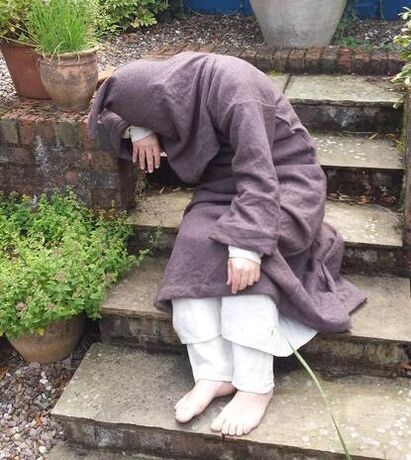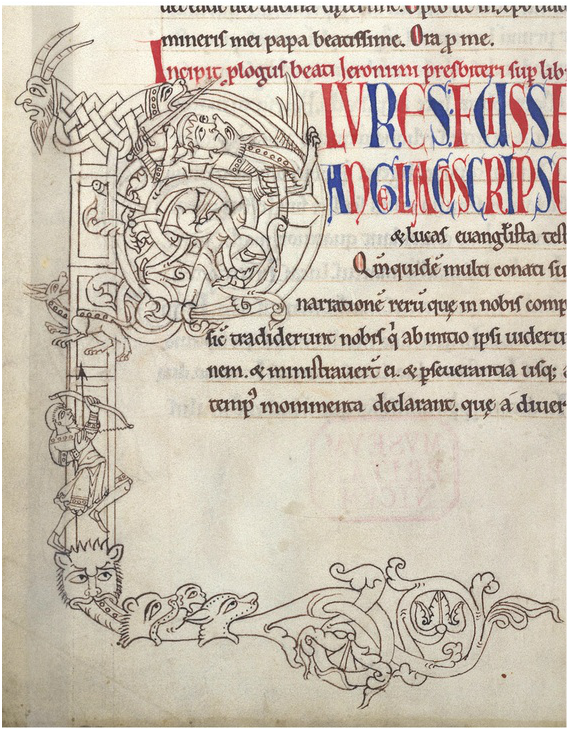So someone else is having a bash at doing Beowulf, that greatest of English epics! Well, something like it. Or, perhaps, a bit like it. Or, most probably, nothing like it. The Anglo-Saxon Monk asks if it really matters if we don’t get to see the real Beowulf ... I knew instinctively, as soon as I read ‘13-part drama’ in the Telegraph’s headline, that die-hard literary purists would be professionally disgruntled with ITV’s fit-for-the-Game-of-Thrones-generation version of Beowulf, our greatest Old English poem.
Now, there may be more than 3,000 lines of verse to play with, but thirteen episodes (presumably 13 x 1 hour, give or take an advert or six)! There has to be just a touch of scribal elaboration there, a hint of amplification. But shouldn’t we be happy that this beloved poem, written down into a manuscript a millennium ago, is still inspiring people in the twenty-first century? Overall, even as an Anglo-Saxon monk, I think we should. We might stamp our hose-and-leather clad feet and protest loudly that the Beowulf story doesn’t need ‘a new female Thane’ (the hero Beowulf’s apparent love interest, so clearly absent in the poem) and ‘thrilling chases’ (on ox-drawn wagons, no doubt) to make sense. Well, of course it doesn’t. I would go as far as to say that present-day audiences would actually get the themes of loyalty, vengeance and futility that surface from the poem’s complex storytelling; that they could be spared the hackneyed, Hollywood, heterosexist romance, just for once, without falling into confusion and despair. (I hope you liked my Anglo-Saxon inspired alliteration just then!) But stories change, don’t they? People are creative, aren’t they? They want to make things ‘relevant’ for today. The latest Beowulf may or may not be yours or my relevant, but it is someone’s, perhaps many persons’, idea of a meaningful story and/or great entertainment. Moreover, specifically with regard to the poem we now call Beowulf, who’s to know how it started out before it was actually put into the form in which it survives today? We know that medieval writers liked to adapt material, give something a different flavour, even, for example, when they were meant to be translating something sacred from Latin into the vernacular. So why shouldn’t today’s writers adapt Beowulf? Furthermore, it’s generally accepted that the poetry of Anglo-Saxon England evolved from an oral story-telling culture. Indeed, Beowulf itself plays with this very idea with its opening line, ‘Hwæt! We have heard ...’, and maintains the conceit of orality with its image of a scop (a singing poet) recounting famed stories of old. If the core heroic ideals and narrative of Beowulf originated and developed within an oral tradition, before the advent of a literary culture, then wouldn’t it be safe to say that the poem’s story was likely added to over the centuries? Shouldn’t today’s writers have a go at adapting it too? It’s interesting that scholars within Anglo-Saxon studies have argued for decades about the date of the poem – when it was originally composed, that is, not when it was written down in the Beowulf manuscript – and I think we should take something from that. Namely, that we can be pretty sure, based on the aforesaid medieval creativity, that the surviving Beowulf story emerged rather than arrived fully formed, that details shifted, new bits were added, old bits were taken away. Now, I’m adamant that there were no female thanes ever, and I’m almost as confident that Beowulf wasn’t especially intended as a story about, to quote ITV’s publicity material, a ‘mighty and capable man slowly reconnect[ing] with the notion of family and home’. It’s about beating up monsters and homosocial bonding, don’t you know! But, nevertheless, I think I will give it a try. And if some ITV agent is reading this, why haven’t you been in touch? Don’t you know I’m from the eleventh-century? Go on ... you know you want to have your say, so please leave a comment below.
2 Comments
Ian Enters
16/12/2014 08:23:07 am
Just wish they'd gone for fleshing out Wife's Lament and Husband's Message- East Enders of the past!
Reply
Chris * The Anglo-Saxon Monk
16/12/2014 11:46:45 am
Ah, good idea, Ian. I fancy Beowulf as some exhiled husband going off to make his fame and fortune abroad then going back home to the Geats and his beloved wife, realising that she matters most. Obviously the author of Husband's Message had something like that in mind. I'd also like someone to adapt the 1970s novel Grendel, which imagines Grendel's perspective. Brilliant adaptation. Perhaps I should write the screenplay myself!
Reply
Your comment will be posted after it is approved.
Leave a Reply. |
Details
|


